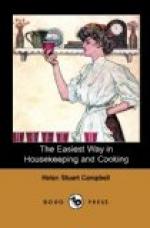The narrative is lively, the incidents probable and
amusing, the characters well-drawn, and the dialects
various and characteristic. Mrs. Campbell
is a natural storyteller, and has the gift of
making a tale interesting. Even the recipes for
pickles and preserves, evaporating fruits, raising
poultry, and keeping bees, are made poetic and
invested with a certain ideal glamour, and we are
thrilled and absorbed by an array of figures of
receipts and expenditures, equally with the changeful
incidents of flirtation, courtship, and matrimony.
Fun and pathos, sense and sentiment, are mingled
throughout, and the combination has resulted in one
of the brightest stories of the season.”—Woman’s
Journal.
Sold by all booksellers. Mailed, post-paid, by publishers,
LITTLE, BROWN, AND COMPANY, BOSTON.
MRS. HERNDON’S INCOME.
A NOVEL.
BY HELEN CAMPBELL.
AUTHOR OF “THE WHAT-TO-DO CLUB.”
One volume. 16mo. Cloth. $1.50.
“Confirmed novel-readers who have regarded fiction as created for amusement and luxury alone, lay down this book with a new and serious purpose in life. The social scientist reads it, and finds the solution of many a tangled problem; the philanthropist finds in it direction and counsel. A novel written with a purpose, of which never for an instant does the author lose sight, it is yet absorbing in its interest. It reveals the narrow motives and the intrinsic selfishness of certain grades of social life; the corruption of business methods; the ‘false, fairy gold,’ of fashionable charities, and ‘advanced’ thought. Margaret Wentworth is a typical New England girl, reflective, absorbed, full of passionate and repressed intensity under a quiet and apparently cold exterior. The events that group themselves about her life are the natural result of such a character brought into contact with real life. The book cannot be too widely read.”—Boston Traveller.
“If the ‘What-to-do Club’ was clever, this is decidedly more so. It is a powerful story, and is evidently written in some degree, we cannot quite say how great a degree, from fact. The personages of the story are very well drawn,—indeed, ‘Amanda Briggs’ is as good as anything American fiction has produced. We fancy we could pencil on the margin the real names of at least half the characters. It is a book for the wealthy to read that they may know something that is required of them, because it does not ignore the difficulties in their way, and especially does not overlook the differences which social standing puts between class and class. It is a deeply interesting story considered as mere fiction, one of the best which has lately appeared. We hope the authoress will go on in a path where she has shown herself so capable.”—The Churchman.
“In Mrs. Campbell’s novel




